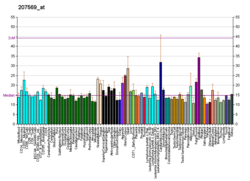C-ros oncogene 1
Proto-oncogene tyrosine-protein kinase ROS is an enzyme that in humans is encoded by the ROS1 gene.
This proto-oncogene, highly expressed in a variety of tumor cell lines, belongs to the sevenless subfamily of tyrosine kinase insulin receptor genes. The protein encoded by this gene is a type I integral membrane protein with tyrosine kinase activity. The protein may function as a growth or differentiation factor receptor.
ROS1 is a receptor tyrosine kinase (encoded by the gene ROS1) with structural similarity to the anaplastic lymphoma kinase (ALK) protein; it is encoded by the c-ros oncogene and was first identified in 1986. The exact role of the ROS1 protein in normal development, as well as its normal physiologic ligand, have not been defined. Nonetheless, as gene rearrangement events involving ROS1 have been described in lung and other cancers, and since such tumors have been found to be remarkably responsive to small molecule tyrosine kinase inhibitors, interest in identifying ROS1 rearrangements as a therapeutic target in cancer has been increasing. Recently, the small molecule tyrosine kinase inhibitor, crizotinib, was approved for the treatment of patients with metastatic NSCLC whose tumors are ROS1 -positive.
...
Wikipedia





